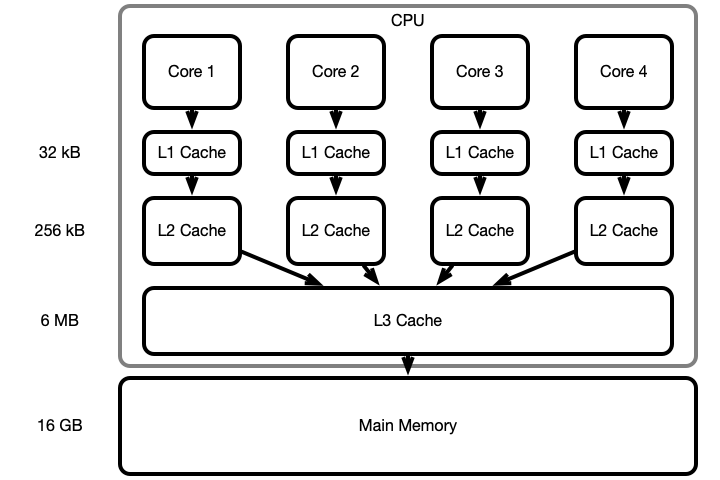Lecture 13: Lock Implementations
Overview
- Peterson Lock
- Test-and-set Lock
- Test-and-test-and-set Lock
Peterson Lock
The Peterson Lock
class Peterson implements Lock {
private boolean[] flag = new boolean[2];
private int victim;
public void lock () {
int i = ThreadID.get(); // get my ID, 0 or 1
int j = 1 - i; // other thread's ID
flag[i] = true; // set my flag
victim = i; // set myself to be victim
while (flag[j] && victim == i) {};
}
public void unlock () {
int i = ThreadID.get();
flag[i] = false;
}
}
A Challenge
Peterson lock assumes 2 threads, with IDs 0 and 1
- How do we accomplish this?
Make a Thread Subclass
Manually set an ID for threads
public class PetersonThread extends Thread {
private int id;
private LockedCounter ctr;
private int numIncrements;
public PetersonThread (int id, LockedCounter ctr, int numIncrements) {
super();
this.id = id;
this.ctr = ctr;
this.numIncrements = numIncrements;
}
public int getPetersonId() {
return id;
}
@Override
public void run () {
for (int i = 0; i < numIncrements; ++i) {
ctr.increment();
}
}
}
Next week: A better way
Making a PetersonLock
class PetersonLock {
private boolean[] flag = new boolean[2];
private int victim;
public void lock () {
int i = ((PetersonThread)Thread.currentThread()).getPetersonId();
int j = 1 - i;
flag[i] = true;
victim = i;
while (flag[j] && victim == i) {};
}
public void unlock () {
int i = ((PetersonThread)Thread.currentThread()).getPetersonId();
flag[i] = false;
}
}
And Now: A Locked Counter
public class LockedCounter {
private int count = 0;
PetersonLock lock = new PetersonLock();
public void increment () {
lock.lock();
try {
++count;
} finally {
lock.unlock();
}
}
public int read () {
return count;
}
}
Finally, We’re Ready to Test It!
D’oh!
What happened?
Memory Consistency!

volatile Variables
Java can make variables visible between threads:
- use
volatilekeyword - individual read/write operations to
volatileare atomic
Drawbacks:
-
volatilevariables are less efficient -
only single read/write operations are atomic
- e.g.
count++not atomic
- e.g.
- only primitive datatypes are visible
- if
volatile SomeClass..., only the reference is treated as volatile
- if
What Variables Should be volatile?
- In
PetersonLock? - In
LockedCounter?
PetersonLock Again
class PetersonLock {
private boolean[] flag = new boolean[2];
private int victim;
public void lock () {
int i = ((PetersonThread)Thread.currentThread()).getPetersonId();
int j = 1 - i;
flag[i] = true;
victim = i;
while (flag[j] && victim == i) {};
}
public void unlock () {
int i = ((PetersonThread)Thread.currentThread()).getPetersonId();
flag[i] = false;
}
}
A Problem
Only primitive datatypes can be volatile
-
volatile boolean[] flagmakes the referencevolatile, not the data itself
How to fix this?
A Fix
Just make 2 boolean variables, flag0 and flag1
- Yes, I know this is ugly
LockedCounter Again
public class LockedCounter {
private int count = 0;
PetersonLock lock = new PetersonLock();
public void increment () {
lock.lock();
try {
++count;
} finally {
lock.unlock();
}
}
public int read () {
return count;
}
}
Testing Our Counter Again
Finally!!!
What have we done?
-
Proven correctness of a lock
- idealized model of computation
- atomic read/write operations
- Implemented lock
- used Java to resemble idealized model
- Used lock
- saw expected behavior
Theory and practice converge!
Limitations
- Limitations of
PetersonLock- only two threads
- weird Java gymnastics to deal with thread IDs
- (more on this next time)
- Limitations of
volatilevariables- can ony perform atomic read/write operations
- only for primitive data-types
- need at least
nregisters (variables) for lock withnthreads
Simplicity through Atomicity
Better locks through atomics:
-
AtomicBooleansupports atomic operations - For example:
ab.getAndSet(boolean newValue)- sets
ab’s value tonewValueand returns previous value
How could you use a single AtomicBoolean to implement a lock?
The Test-and-set Lock
public class TASLock {
AtomicBoolean isLocked = new AtomicBoolean(false);
public void lock () {
while (isLocked.getAndSet(true)) {}
}
public void unlock () {
isLocked.set(false);
}
}
Advantages/Disadvantages?
public class TASLock {
AtomicBoolean isLocked = new AtomicBoolean(false);
public void lock () {
while (isLocked.getAndSet(true)) {}
}
public void unlock () {
isLocked.set(false);
}
}
How Does TASLock Perform?
- test on laptop
- test on Remus/Romulus
A Tweak: TTASLock
In TASLock, we do a lot of getAndSet() operations under contention
public void lock () {
while (isLocked.getAndSet(true)) {}
}
Since getAndSet is expensive, we could try:
- only attempt
getAndSetif we’ve seenisLocked.get() == false
Test-and-test-and-set Lock
public void lock () {
while (true) {
while (isLocked.get()) {};
if (!isLocked.getAndSet(true)) {
return;
}
}
}
How does this affect performance?
Next Time
- Knowing when to back off
- Using queues to lock
- thread-local objects